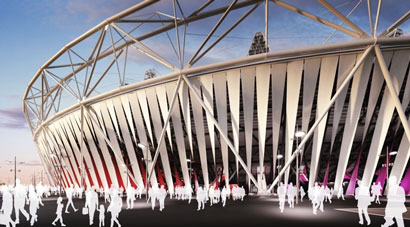 |
| 2012 London Olympics Logo. Photo by Nigel Chadwick. |
The complaint notably was written four years after the publication of the 2012 logo. The IOC responded, “The London 2012 logo represents the figure 2012, nothing else.” Iran has called for a boycotting of the 2012 Olympics.
Most recently there has been a major controversy about one of the main sponsors for the event, Dow Chemical Company. Dow is sponsoring the stadium wrapping, a seven million dollar deal. Many environmentalists have questioned this deal because of an environmental disaster that happened in Bhopal India.
In 1984 the chemical company Union Carbide changed the city of Bhopal forever with possibly the worst industrial environmental catastrophe in history.. On the night of December 3rd at the Bhopal pesticide plant in India, water had leaked into the canisters containing methyl isocyanate, which then leaked in the form of a toxic gas across the city of Bhopal. About 3,000 people died from the incident and an estimated 8,000 have died from gas-related diseases. The general conditions of the plant were horrendous. With workers being told not to replace faulty parts, and there was no plan in place for knowing how to deal with such an incident. The alarms had not been functioning for four years, the boiler was not on for unknown reasons, but the few safety measures that were put into place, such as water sprayers to reduce the concentration of the gas were barely functioning; the list goes on and on.
The Indian government passed the Bhopal Gas Leak Disaster Act, which granted the government the right to represent everyone who was affected by the disaster. Union Carbide offered to pay out a mere $350 million when the government demanded $3.3 billion dollars. They eventually decided on a $470 million compensation. Not long after Union Carbide decided to sell off their Indian subsidiary (UCIL), and were forced to finance a 500 bed hospital that would give free health care to all of those affected by the Bhopal disaster; that was in 1998.
 |
| The 2012 Olympic Wrap sponsored by Dow Chemicals. |
India has not been the only one to complain, Britain has as well. The Telegraph reported that, “One of the councils neighbouring Olympic Park, Tower Hamlets, is now set to debate a motion to demand the removal of the wrap because it does not meet the Locog sustainable sourcing code.”
Sebastian Coe, the chairman of the IOC defended the deal, saying that Dow should not be held responsible because they were never directly involved with the Disaster.
"I am the grandson of an Indian so I am not completely unaware of this as an issue," Coe said. "But I am satisfied that at no time did Dow operate, own or were involved with the plant, either at the time of the disaster, or, crucially, at the time that the full and final settlement was made."
It looks as if the 2012 Olympic Games will continue, unaffected by the complaints of humanitarians around the world. There have only been quiet rumblings of anyone actually boycotting the Olympics, and no player has come forward saying that they will. The debate continues over the 2012 Olympics continues, but one thing is certain; nobody is listening.
No comments:
Post a Comment